It's a ridiculous question on its face - I mean, everyone likes Final Fantasy, right? It's the McDonald's of RPGs: there's something on the menu to your tastes, and you've probably had at least of the stuff they serve over your life. But I got thinking, mulling over my own reaction to FF7 and the changing fortunes of the popular response to the game, that, "hey, that really wasn't as good as the other installments," and then I checked myself, and I thought - wait, did I like most of the other installments? And I don't know:
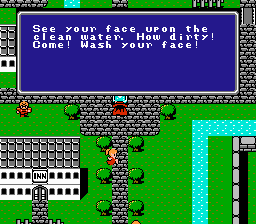
FF1: This was one of my first proper RPGs. I got the NES cart as a birthday gift when I was a kid. It's a big adventure - it certainly seemed that way when I was a child, with the thick manual and the big map with the voluminous bestiary of the enemies you'd be up against printed on the back. It has quality and polish in its presentation that transcends its primitive platform: Nobuo Uematsu's music, which uses sets of strong, short phrases to overcome the limited instrumentation, and the surprisingly faithful digital renditions of Yoshitaka Amano's abstract enemy art, plus the English script, which is fluid and at times even poetic.
It belongs, though, to an older tradition of RPGs, one where narrative is a bit of an afterthought and getting bigger numbers for your characters is your primary focus. It wants to give you a good, long challenge, and it succeeds on that account - I recall a lot of meaty dungeons in FF1, such as the Sea Shrine or Air Castle - but, like much in its era, it's not shy about handing you drudgery or grindwork in pursuit of that goal: that "99 HEAL potions for the Marsh Cave" business sure wouldn't fly today. I liked it enough as a kid to be viscerally disappointed upon learning in Nintendo Power that what was being marketed as the direct sequel wouldn't pick up with the same world or characters, and I regard it, somewhat abstractly at this point, as a good game. I don't think I'd ever play it again.
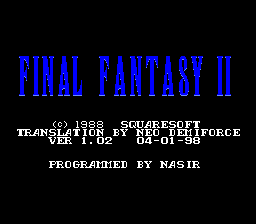
FF2 - VGMuseum didn't have great screenshots, all right: I tried this on emulation, and I think I got pretty far with it - up to the Dragoon castle, which is an odd place for this Kain fan to quit. My playthrough had the wind taken out of its sails by the patch having a thwarted villain abscond with a cry of "You spoony...guy!", which is a not only an embarrassingly limp reference but cast doubt on whether or not what I had read was the actual story or just something the "translators" made up. (After this, I decided to trust my language skills and play Japanese imports exclusively in glorious Nihongo.)
I wasn't having a great time before that point, though. The combat system is broken, of course. I also recall a stretch after gaining the ship where I got lost for four hours and either couldn't find Mysidia or found Mysidia way ahead of when I was supposed to find it, and I recall the Dragoon castle calling for more grinding than I was willing to expend by that point. The game makes the series' first attempt at a twisty character-driven narrative, but from what I played, this amounts mostly to a bunch of maudlin death scenes out of nowhere for the add-on party members in your revolving-door fourth slot. I don't think I ever met its Jareth-inspired main villain.
FF2 had ambition that was ahead of its time, and that would normally endear it to me, but the unpleasantries in the execution make it a tough play. I'd like to see the late game stuff with the drama-king Emperor and the Dark Knight plot twist and the drastic swerve in setting, but there are so many better, less-aggravating games I've yet to play.
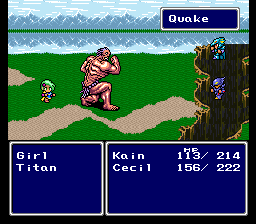
FF4: FF4 was my favorite game for a very long while, and I still have a lot of love for it. If I'm engaging in a cross-game FF activity - if I'm playing Theatrhythm in the arcade, if I'm browsing merchandise - it's Kain & Rydia & Cecil who are going to get my attention. I'm not alone; FF4 was, in a softer way, part of what FF7 was for the PlayStation generation, an introduction to how a character-driven narrative married to accessible gameplay could be emotionally affecting. Nowadays, FF6 has the significantly-faded prestige, but FF4 got the remakes and the (dreadful) sequels and the fond memories. FF4 has the love.
Nowdays, though, I have very little patience for stories about entitled young heroes whose struggle is to get everyone else to recognize that they're the best ever and hand them everything they want. I find it a trial to waste any time on Alex's bratty mewlings when Ghaleon's story is right there. Cecil has to struggle a bit, but he's still a homecoming king. (Despite nominally starring in a tale of redemption, there's never any idea that Cecil's a genuinely bad person, either - his story involves no genuine change of heart.) Like Cloud's story, Cecil's isn't as dramatic a break from an adolescent power fantasy as popularly remembered. I find Kain's tale more interesting - his struggle with not-unfounded resentment against people he genuinely loves, and who love him (although not always in the ways he wants). But this, too, collapses: Kain must fail because he is Cecil's rival and Cecil is better than anyone.
I still cherish that transcendently sad overworld theme, and Kain's dragon armor, one of the coolest looks in RPGs, and Rydia's respendent green and her saving everyone from Golbez, and Edward & Anna's simple but affecting story of love and sacrifice, and Cecil's poignant cameo in Secret of Evermore, which very much reflected the game's woebegotten status in the U.S. at that time. It'll probably always be my Final Fantasy. To an extent, though, it's in the past for me.
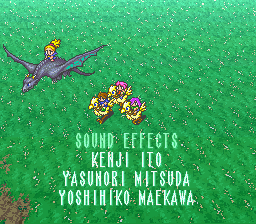
FF5: Undoubtedly, the best part of FF5 is the job system. The plot is a bunch of utter nonsense. A crucial scene revolves around a turtle chairing a library board meeting. The villain is an evil tree. Why he's an evil tree is never explained. I forget what he was trying to do, even. (I think it was mentioned in an Ultimania or whatever that the tree had executed criminals nailed to it and got to be a bad tree that way, but that doesn't explain how the tree got to be ambulatory, sentient, or omnipotent.) The only memorable scene is Galuf being beaten down to 0 HP and yet refusing to die because he has to save his granddaughter, dammit. The characters are so congenial (though, signficantly, not indelible or endearing) and the game so laid-back and low-stakes that it's hard to hold any of this against it, but the "story" remains a pastiche of character scenes that never create a plot.
I recall it being fun, very fun! It's great in the moment, and it's difficult to overstate the versatility and richness of that job system, where almost every single profession is crafted from hidden depth and awesomeness - it's maybe the best the series has been mechanically. But you ain't gonna get "NOT GHALEON, DEAR QUARK" or "don't let them ever repeat the mistake they made when they made me" from this.
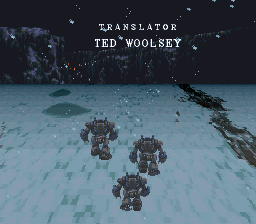
FF6: FF6 is my least-liked Final Fantasy game. For a great period of time, I was actively resentful toward it. It was praised to high heaven long before its release in the States and enshrined as The Greatest RPG Ever Made for much longer than quality warranted before history rightfully judged Chrono Trigger more worthy of that crown in the SNES department. During its reign, however, the gaming populace very much wanted to leave my beloved FF4 behind, in the dust - an embarrassment, it was alleged, compared to the then-new hotness. This seems unthinkable now, as the games' fortunes are largely reversed, but it's true. (There's that bit in Secret of Evermore, released at the end of the SNES lifecycle, where Cecil's tending a dusty old armor shop trying to tell stories of his adventures to customers who don't remember them, and it's very much true to the standing of Cecil and his game at the time.) So of course I hated FF6.
But, as related in that Rydia essay on Tumblr I linked, I initially wasn't keen on FF4, either, as it represented something different from FF1, its then-predecessor in the U.S. I came around greatly on 4, but never on 6. It took me a good long time to figure out exactly why. Well, not in broad strokes: I was attracted by the character-driven story in 4, and I really don't like the characters in FF6. It's helmed by two women, and I found the women underwhelming: Terra's little more a plot device, tossed around like a cat toy by the warring sides for her abilities and a wan, pale dishrag outside of the power struggle. (I can understand that she'd withdraw from life given how little it accorded her, but it doesn't make for a compelling protagonist.) Celes's big character arc is "get over your independence and learn to be a fainting damsel." Poor follow-ups to Rydia (or Faris, Lenna, and Krile).
At great, great length, though - not until the past few years, in fact - I realized that the problem really isn't Terra or Celes. It's Locke. I don't know if there was some higher-up dictate that they finally make an FF helmed by women imposed on the dev team, but they clearly didn't want to do it, as Locke is constantly undermining the two leads at every turn: he insists on "escorting" the women throughout the first half, cast as the competent one who has to rescue them constantly from being in over their pretty little heads. The game forces you to put Locke in your party in the World of Balance more than either nominal lead. Recruiting him again in the World of Ruin is cast as a defining event in the story, the reward for a sprawling multiparty dungeon second in complexity only to Kefka's Tower, cementing him as the cornerstone of the party. For all the electronic text the game can expend on castigating Celes for being insufficiently "feminine," Locke never faces the slightest of remonstrations for the walking mass of complexes (thank you, Hojo) into which he molded himself and inflicts on others after the Rachel incident. There have been plenty of scummy latter-day attempts to have Locke edge out Terra & Celes as the face of FF6 with Dissidia and the mobile titles and later Amano art - yeah, we're so sorry we made the mistake of putting women in the leading role; we're doing everything we can to rectify the error.
The devs don't have faith or interest in their two female leads, and the main male character (and you might as well throw partner-in-crime Edgar, the second most-prominent male chara, in there) comes out looking like a creep. The center of the cast cannot hold, and there isn't enough color in the characters on the fringes to stop the whole complement from tumbling into the sinkhole.
Despite the story problems, I have some very fond memories associated with the game. I remember turning on my rented copy before school to watch Terra's Mode 7 march through the snow to the wintry remix of her theme, staring at the TV predawn illuminated only by the lights of Narshe in a season just as cold and dark outside as it was onscreen, just to drink in the atmosphere one last time before I had to take it back to the video store. A very dear friendship with a penpal - the only person with whom I could discuss RPGs in my pre-Internet adolescence; the one who introduced me to Lunar - started with him sending me, totally out of the blue, a loose copy of the SNES cart. I got deeply involved in Shadow's story from the first time those chords announcing that first nightmare fouled my TV's sound channels, and chasing down every bit of his background became my major source of investment in the title. (That and General Leo's end, which also grabbed my heartstrings.) Repeatedly playing through a chunk of the game from the three-way fight against Kefka to the ascension of the Floating Continent got me through a difficult time in my life. So many emotional memories! And yet my impression is overall negative. I will say this, though: a Celes-Edgar-Setzer run through the World of Ruin provides the absolute best realization of the bleak tone of the back half.

